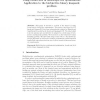Free Online Productivity Tools
i2Speak
i2Symbol
i2OCR
iTex2Img
iWeb2Print
iWeb2Shot
i2Type
iPdf2Split
iPdf2Merge
i2Bopomofo
i2Arabic
i2Style
i2Image
i2PDF
iLatex2Rtf
Sci2ools
115
click to vote
WEA
2010
Springer
2010
Springer
Using Bound Sets in Multiobjective Optimization: Application to the Biobjective Binary Knapsack Problem
This paper is devoted to a study of the impact of using bound sets in biobjective optimization. This notion, introduced by Villareal and Karwan [19], has been independently revisited by Ehrgott and Gandibleux [9], as well as by Sourd and Spanjaard [17]. The idea behind it is very general, and can therefore be adapted to a wide range of biobjective combinatorial problem. We focus here on the biobjective binary knapsack problem. We show that using bound sets in a two-phases approach [18] based on biobjective dynamic programming yields numerical results that outperform previous ones, both in execution times and memory requirements.
Related Content
| Added | 18 May 2010 |
| Updated | 18 May 2010 |
| Type | Conference |
| Year | 2010 |
| Where | WEA |
| Authors | Charles Delort, Olivier Spanjaard |
Comments (0)

